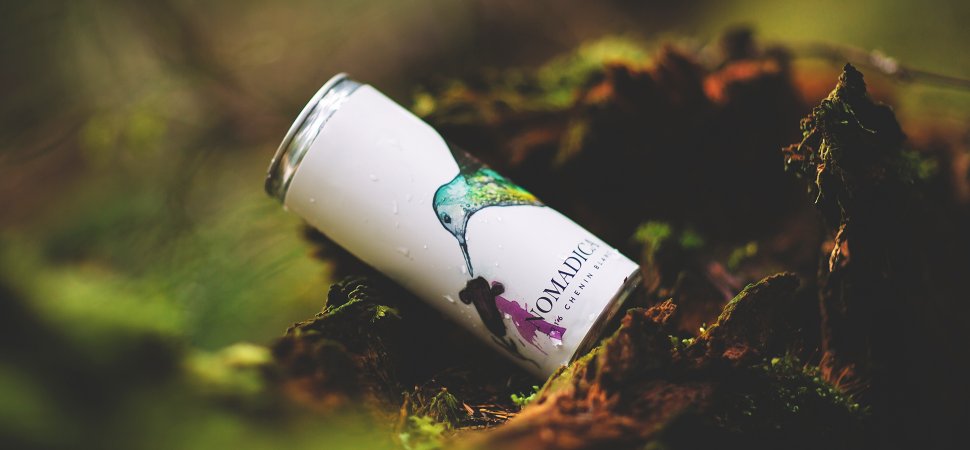Emma Toshack always enjoyed having some wine when she went to the beach or the pool behind her Los Angeles apartment building, but glass containers and public consumption of alcohol weren’t permitted. So to get around the rules, she would pour a $30 bottle into an empty San Pellegrino can.
It was not an ideal solution. There were canned wine options, but she felt none offered both the convenience and premium quality she craved.
“There was a perception that the drink doesn’t matter in those formats,” Toshack, the founder and CEO of Nomadica, an L.A.-based canned wine company that launched in 2017, says of the quality of canned wine. “I think the wine space has been ripe for doing things differently and starting to break the rules for a while.”
Toshack’s two-employee company aims to do just that, starting with its cans, which are decorated by illustrators and street artists. And Nomadica doesn’t own a vineyard, instead collaborating with winemakers to provide its varietals. The company pays the winemakers a fee up front rather than giving them a percentage of sales.
Toshack says these collaborations keep costs low, and allow her to sell a wide variety of wines from different parts of the world. A 187-milliliter can costs $5, the 250-milliliter option sells for either $6 or $7, and a case of 24 cans–the equivalent of about eight bottles of wine–is priced at between $115 and $130.
“I thought, ‘What if there was a wine brand that was nomadic in a way and takes people on a wine journey around the world?'” Toshack says. “That way, they feel more comfortable trying something from a new region because they recognize the brand and know they can trust us.”
Her company is achieving that goal by selling wines–selected by wine director Kristin Olszewski–that include a white blend made from Oregon grapes, a Pinot Noir from California’s Mission Ranch Vineyard, and a sparkling rosé made from Santa Ynez Valley, California, grapes. Nomadica is sold online and in restaurants, hotels, bars, and boutique liquor and grocery stores.
Nomadica sells in California, New York, Vermont, Oklahoma, and Washington, D.C., areas that Toshack picked to gauge interest in her wines. She plans to expand to another 12 states and Australia later this year.
Toshack declined to share Nomadica’s sales, but says revenue was in the low six figures last year, and grew 1,400 percent in January 2018 compared with the same month in 2017.
Canned wine’s growing popularity.
Canned wine is still a niche within the wine industry, but it’s a rapidly growing one. Total U.S. sales for canned wine jumped to $32.3 million last year from $3.3 million in 2014, according to Nielsen. A major force in the industry’s expansion is Millennial wine drinkers who want a beverage they can take on the go. And in contrast with bottled wine, most people don’t feel they need a special reason to purchase wine in a can, says Nielsen senior vice president Danny Brager, citing a November 2017 survey by the data and analytics company.
The industry’s fast growth has made the competition fierce for entrepreneurs. Nielsen estimates there are more than 60 brands that either exclusively sell canned wine or offer a canned option in addition to their bottled varietals. Toshack says Nomadica competes with wine bottles priced between $18 and $30.

Despite the crowded market, Toshack says one of the major challenges she faced early on was skepticism about wine in a can. She says that hesitation already has declined since Nomadica’s launch, as people have become more comfortable with the product, but there are still some traditionalists who prefer bottles. Another obstacle is juggling the many disparate roles required of a wine startup founder–she’s the one responsible for finding collaborators, canning the wine, and delivering it to distributors.
Toshack’s winding career path mirrors her company’s nomadic theme. The 33-year-old founder dabbled in multiple fields before starting the company. She grew up in Sydney and enrolled in law school, but dropped out before earning her degree. She then started a modern Australian restaurant, where she served as head chef and got experience buying and tasting wine. When her restaurant burned down a year later, Toshack went back to law school.
Following her graduation in 2009, Toshack spent several years working at the Boston Consulting Group in Sydney before enrolling at Harvard Business School. It was there she got the itch to start something of her own but didn’t yet have the right business idea. She worked at Snapchat in Los Angeles for nearly two years before launching Nomadica.
While Toshack says her experience and education helped prepare her for entrepreneurship, she didn’t anticipate her work’s being such a heavy load–literally. She jokes she’s eager for Elon Musk to finish his driverless Tesla trucks so she won’t have to lift and haul heavy boxes of canned wine.
“Come on, Elon,” she says. “We need you.”












